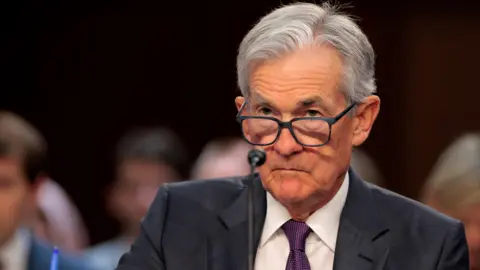Trump discussed firing Fed boss but 'highly unlikely' he will
President Donald Trump has said it is "highly unlikely" he will fire the head of the US central bank, hours after asking lawmakers whether he should sack Jerome Powell.
Stock markets and the dollar slipped following reports Trump had broached the idea with Republicans on Tuesday but quickly bounced back after he downplayed the discussions.
Dismissing the chair of the Federal Reserve would be a major break with precedent.
Trump has repeatedly called on Powell to lower US interest rates in a series of highly critical outbursts, which continued on Wednesday when the president called him a "knucklehead" and claimed he was "doing a lousy job".
Speaking at the White House, the president acknowledged that he had revived discussions about firing Powell - who Trump nominated for the role during his first term - but said he was "not planning on doing anything".
Pressed on whether he was ruling out the idea, he said: "It's highly unlikely unless he has to leave for fraud."
The president's allies have joined in the attacks against Powell by accusing the central bank boss of mismanaging the renovation of Fed properties.
Last week, budget director Russell Vought called for an investigation into cost overruns on a $2bn (£1.5bn) project to renovate Fed buildings in Washington. Trump said earlier this week he thought it was "sort of" a fireable offence.
Analysts at Deutsche Bank said the recent shift in the focus of the attacks suggested the administration was building a case against Powell.
"Whether or not the president chooses to act on this case is an open question," they wrote, noting that recent developments "suggest that the risk has risen".
The Federal Reserve was established by Congress and has powers to set policy independent of the White House.
Powell's second term as Fed chair ends in May next year and he can stay on as a governor of the central bank until 2028.
Under federal law, the president can remove Fed governors before the end of their terms "for cause". The phrase typically implies serious misconduct.
Powell has repeatedly stated his intent to serve out his term as chair, denying that Trump has the power to fire him over a policy disagreement.
The Fed has also pushed back against the criticism of the renovations, updating its website with information to respond to some of the attacks.
It has said the renovations will ultimately reduce costs by allowing it to consolidate operations and blamed the increase in expenses on "unforeseen conditions" such as more asbestos than anticipated.
Trump has flirted with the idea of firing Powell since his first term, when he objected to the Fed raising rates. He has repeatedly stepped back from the plan in the face of investor concern, however, including most recently this spring.
But on Tuesday, Anna Paulina Luna, a Republican congresswoman from Florida, wrote on social media that the firing was "imminent". It followed posts by other Trump allies in recent weeks suggesting Powell might be stepping down or calling for him to go.
A senior White House official confirmed to the BBC that Trump had indicated to Republicans that Powell's firing could happen soon.
 Getty Images
Getty ImagesThe White House's increasingly determined aggression against one of the most important independent institutions in the world is adding a new dimension to a fragile global financial system, which is already reeling from Trump's trade wars.
The US economy is slowing and facing stressors from the president's sweeping tariffs which economists have warned could fuel inflation.
As head of the Fed, Powell plays a key role helping to determine where the US central bank sets interest rates, a decision with implications for borrowing costs across the economy.
The key interest rate is currently hovering around 4.3% which is down from last year.
However, the Fed has not reduced it as quickly as other central banks such as the European Central Bank and the Bank of England - something Trump has highlighted.
The president is among those arguing that it should be lowered to make it easier to borrow and give the economy a boost.
Powell has said the bank, which is charged with keep inflation stable, should proceed cautiously given concerns that tariffs could raise prices.
Many economists and investors have warned that political interference in the leadership of the Fed could would risk undermining price stability and investor confidence.
Speaking to analysts earlier this week, the head of America's biggest bank warned that the Fed's independence was "absolutely critical".
Jamie Dimon, chief executive of JP Morgan Chase, said: "Playing around with the Fed can often have adverse consequences, the absolute opposite of what you might be hoping for."
Treasury Secretary Scott Bessent said earlier this week that a "formal process" was under way to identify a replacement for Powell. He described Trump's criticism of Powell as "working the refs" - alluding to efforts to pressure referees in sports games.
Trump has floated Bessent as a candidate. Others in the running include Kevin Hassett, who currently leads Trump's National Economic Council, and conservative economist Kevin Warsh.
Powell was nominated to lead the Fed by Trump in 2017, replacing Barack Obama's appointee Janet Yellen.
Former President Joe Biden extended his term in 2021.
